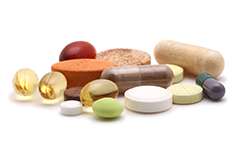
The FDA does not require expiration dates on supplement bottles so many companies don't include them.
While often the expired vitamins simply don't provide any benefit, there are a few that could become rancid, which isn't healthy to take.
One of the biggest mistakes people make in their desire to supplement their diet is taking inexpensive vitamins.
Buy 1 get 1 deals or supplements at your grocery, pharmacy or products you can buy through the mail are rarely, if ever, worth taking.
In addition to often vitamins being expired, they can simply be so cheaply and poorly made, they may even be risky to take.
The reality is, that high quality raw materials are expensive.
This includes the research it takes to ensure they are of high quality, free of contaminants and that the ingredients in the products do what they're intended to do.
A company could actually spend several thousand to test just one ingredient. This is why bargain basement supplements are either near useless or downright dangerous.
This is one of the main reasons I feel safe using Shaklee's products.
The reality is, that high quality raw materials are expensive.
This includes the research it takes to ensure they are of high quality, free of contaminants and that the ingredients in the products do what they're intended to do.
A company could actually spend several thousand to test just one ingredient. This is why bargain basement supplements are either near useless or downright dangerous.
This is one of the main reasons I feel safe using Shaklee's products.
I'm not saying this just to be a commercial. I'm saying this because it's true.
Case in point. Not too long ago, bales of raw ginseng were found to be full of a carcinogenic herbicide used to keep mold from growing on it.
Case in point. Not too long ago, bales of raw ginseng were found to be full of a carcinogenic herbicide used to keep mold from growing on it.
The fields all through the area had experienced severe flooding and the grower was in danger of losing their crop, which is why they used the chemical.
Shaklee tested the raw ingredients and found the dangerous herbicide.
Shaklee then rejected their batch and refused to sell ginseng for 2 years until they could get a supply that was guaranteed to be free of nasty contaminants.
There was none to be found for 2 years - none that wasn't contaminated that is.
There was none to be found for 2 years - none that wasn't contaminated that is.
Shaklee believed the health of it's consumers far outweighed the loss of revenue it could have had from the sale of ginseng.
They lost money because they believed people's health was more important than the bottom line.
What do you think that supplier did with the batch of ginseng that was full of that dangerous herbicide that Shaklee rejected?
Do you think they just threw it away?
No, they just ended up selling it to another vitamin manufacturer who does not test for dangerous chemicals.
For two years the suppliers continued to provide the contaminated ginseng to other vitamin manufacturers.
To my knowledge, Shaklee was the only company that stopped selling ginseng until the raw ingredient could once again be provided without contamination.
For two years the suppliers continued to provide the contaminated ginseng to other vitamin manufacturers.
To my knowledge, Shaklee was the only company that stopped selling ginseng until the raw ingredient could once again be provided without contamination.
Scary, isn't it?
You're taking your chances in hoping that cheap vitamin manufacturers will spend the money needed to test raw materials for contaminants like this.
If the FDA doesn't require it, they typically don't do it.
I suggest you do your research, like I did and check out the brand you are buying.
You're taking your chances in hoping that cheap vitamin manufacturers will spend the money needed to test raw materials for contaminants like this.
If the FDA doesn't require it, they typically don't do it.
I suggest you do your research, like I did and check out the brand you are buying.
Ask them questions about their testing of raw ingredients and the finished product after manufacturing.
In addition to not checking their ingredients for dangerous chemicals, many cheap vitamins often contain additives, food allergens, sugar, artificial food coloring and flavoring.
Yeah, like we need to supplement with that!
Did you really think "gummy vitamins" were good for you?
Many are coated with shellac. Isn't that used in paint varnish? Yuck! Or they could contain potentially hazardous chemicals like chlorine.
Potency and purity can vary widely from pill to pill and bottle to bottle as well. With a lack of strict quality controls, you never know what you are going to get.
A study at Duke University examined 12 bottles of one popular supplement. It's hard to believe but these samples showed they contained 60% or less of the amount of nutrients claimed on the label!
Yes calcium and some other nutrients can last for years, however, others like vitamins B and C, are unstable.
The company better know what it's doing when combining vitamins together that both you and your children will eat.
This is why I believe in Shaklee.
Watch this short video on what is done to ensure your safety:
What did you think about all those tests?
I know I feel safe giving my family something that has been tested up to and even beyond some pharmaceutical standards.
Still not sure about your vitamin? Want to know how to choose a good one for yourself?
You can request my
and learn how to choose a high quality supplement.
Learn the right questions to ask when choosing which supplement is best for your family.
The more you know the healthier you can be.
We want You To Be Healthy!

Comments